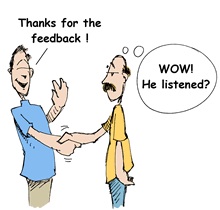 Across all my roles in leadership, I have found there are two distinctive types of staff members when it comes to feedback. There are those who see it as an opportunity for improvement and those who see it as a personal attack. This can be said for receiving and providing feedback. I am sure we have all experienced a manager that has used a performance appraisal for either good or evil!
Across all my roles in leadership, I have found there are two distinctive types of staff members when it comes to feedback. There are those who see it as an opportunity for improvement and those who see it as a personal attack. This can be said for receiving and providing feedback. I am sure we have all experienced a manager that has used a performance appraisal for either good or evil!
Receiving feedback well can be a challenge. If I think back to myself early on in my work journey, I now realise I was quite poor at accepting feedback. I would become defensive and try to counter comment all the time. However, as I came to understand myself better and develop my emotional intelligence (EQ) I realised there will always be room for improvement. Basically there are two clear options, you can fight people who give you feedback, or listen carefully, thank them and then decide what to do with it. Accepting and reacting to feedback are very different and your level of EQ will reflect in your reaction. Because you accept it, does not mean you necessarily agree. However, the key action you should do is take the time to consider if it is in line with your values and goals. Why? If it is not congruent to them, it is vital to remember it is only someone’s opinion based on your actions or non actions overlaid against their perceptions.
Giving feedback is no different to receiving it. As we know, both can create angst. Before you start, consider asking questions with the intention of understanding another persons situation or thinking. Unless we understand why someone is doing something a particular way, any feedback we give will be irrelevant at best. We also need to focus on the EQ aspect and keep in mind that what we want is different from what other people want. Therefore never assume that your path is the right path for all. Whenever possible, share your own experience and lessons learned instead of simply telling someone what to do. Finally, focus on how you see the future outcomes should achieved be not how good, bad or indifferently they were done before.
Remember feedback is a two way street, and should be treated as an open and frank conversation between two adults, not an exercise in finger pointing or blame.
In June, Engaging Leaders will be running one day workshops across Australia focussed on developing skills for the conversation revolution to create greater commitment, real accountability for results, and improved organisational performance.
Enjoy your week, Peter Russo
